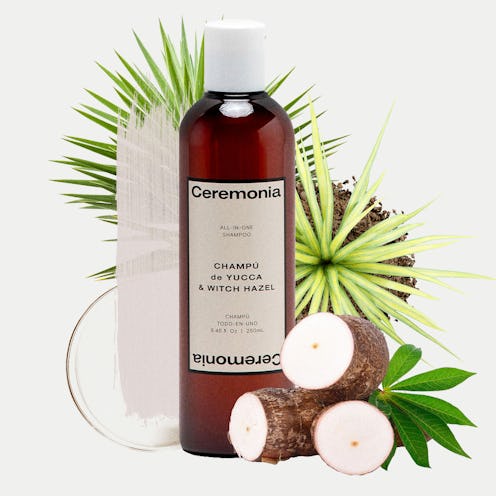(Back To Basics)
This Anti-Dandruff Ingredient Has Been Used By Indigenous Cultures For Centuries
It also works wonders on dry, irritated skin

With new products, brands, and categories popping up every day, beauty can be a bit overwhelming. Back to Basics is our rudimentary beauty series that serves as your crash course on the science behind some of the best formulations in the game.
Some ingredients are so commonly used and widely recognized that they almost become synonymous with skin care itself. Ingredients like hyaluronic acid, retinol, and peptides are all good examples of this. Others aren’t so widely recognized, yet they’re steeped in history and cultural importance. Examples include mugwort, which has a long history of use in Korean culture, prickly pear, which is revered in Latinx culture, and yucca for skin and hair. Indigenous cultures have used the latter throughout the Southwestern United States and Northern Mexico for many years.
Used in traditional medicine as a remedy for diseases and conditions like digestive disorders, inflammation, and even dandruff, this ingredient can also be found in a variety of popular skin care and personal care products.
According to Dr. Ava Shamban, a board-certified dermatologist based in Los Angeles and founder of Ava MD Dermatology, SkinFive Medical Spas, and The Box by Dr Ava, “It is a perennial plant mostly native to hot and dry regions of the Americas with nearly 50 known species — not all of which are as potent for skin care as others, but all with highly valuable medicinal activities. Most often the Mojave Yucca varietal is what is used for skin care. It is a hearty desert treasure found throughout the American Southwest.”
Cece Meadows, founder, and CEO of Prados Beauty says the plant has myriad uses. “Yucca is often confused with yuca as the two have a difference in visibility and usage. Yuca is more like a large peanut-shaped vegetable and can be cooked and eaten in various ways. Yucca is an ornamental plant that has very spiky and pointed leaves [and] is prominently found in the warmer climates of North America and Mexico. Yucca does grow fruit, seeds, and flowers which can be eaten or used for traditional medicine in Indigenous cultures.”
What Are the Traditional Uses of Yucca?
As a Xicana and Indigenous woman, Meadows has personal and familial associations with the plant. “Yucca in my family was used to treat arthritis, wounds, irritated scalp, and acne,” she says. “My grandparents had a home in Mexico on their traditional lands and yucca grew abundantly in their backyard. When they came to the US they transplanted some of the plants in their home in Arizona as the climate was perfect for their growth. My grandfather fell off of a horse in the late '80s and was debilitated and suffered with excruciating pain for years, while he wasn't a fan of painkillers, the yucca plant served as an anti-inflammatory and wound healer. My grandmother would also put it in our hair when she would give us scalp treatments and hair masks!”
She says it continues to be used today by Indigenous peoples. “I use it in my home to treat my PCOS-prone acne, wounds, hair, and on days when my old softball injuries are acting up. We have Yucca plants growing outside and inside of my home. For the plants that are growing inside, they tend to grow smaller so you can extract the ingredients easier. I like to boil mine and then blend them in the blender for an additive to my face masks. I also like to use the boiled parts as a tea that can be ingested or placed in my hair care routine.”
Why Should You Consider Using Yucca Products?
According to Shamban, the benefits of yucca are both various and profound. “While it may not be as popular as other roots, plants, or botanicals, it does pack potent protection and benefits for the skin. Yucca is very high in antioxidants which protect against free radical damage and oxidative stress. The extract is milked from the root of the plant, often referred to as the soap root — due to its clarifying, cleansing, and antiseptic components. Also high in folic acid, and super potent vitamin C, it is integral to support the activation of fibroblasts and collagen production in the dermis.”
Cosmetic chemist Ron Robinson of BeautyStat.com also praises its high antioxidant content as well as its saponin content. Saponin is a natural plant compound that has soap-like properties, which explains why it’s also traditionally used as a shampoo and hair treatment. “Yucca can eliminate build-up, dead skin cells and combat environmental sludge, as well as alleviate dryness, flaking, and dandruff,” Shamban explains.
Board-certified dermatologist and founder of Skin Science Dermatology, Dr. Geeta Yadav, says you can also add anti-inflammatory and photoprotective properties to yucca’s long list of benefits. “It can help stave off sun damage — just don’t replace your SPF with yucca!”
Are There Any Risks?
While alleviating dandruff, providing antioxidant protection, and minimizing inflammation are all tried-and-true benefits of yucca, be cautious to not overuse it on the skin if you’re sensitive. According to Dr. Geeta Yadav, saponins “have the potential to be sensitizing. Consider performing your own patch test — or better yet, seeing your dermatologist — before starting your new routine.”
Overall, though, yucca is an effective ingredient for skin and hair products. It offers natural anti-inflammatory and antiseptic benefits, and it can even help protect your skin against free radical damage.
Ahead, check out three expert-recommended yucca skin care products to shop now.
We only include products that have been independently selected by TZR's editorial team. However, we may receive a portion of sales if you purchase a product through a link in this article.